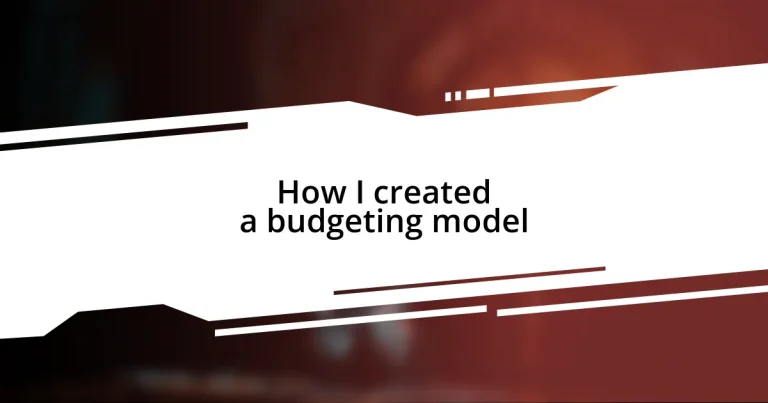Key takeaways:
- Understanding budgeting involves tracking income and expenses to identify spending patterns and cut back on unnecessary costs.
- Setting specific financial goals provides clarity and motivation, making budgeting a roadmap to achieving personal aspirations.
- Choosing a budgeting method that aligns with personal habits is crucial for maintaining financial discipline and flexibility.
- Regularly monitoring and adjusting the budget helps stay on track, celebrate small victories, and make informed financial decisions.

Understanding budgeting basics
Budgeting is more than just jotting down numbers; it’s about understanding your financial landscape. I remember when I first sat down to create a budget. It felt overwhelming, but I quickly realized that knowing my income and expenses was the key first step. Have you ever felt lost trying to track where your money goes?
Every small expense matters. I still vividly recall the time I tracked my daily coffee purchases; those seemingly small indulgences added up quickly! It was a real eye-opener and forced me to rethink my spending habits. By identifying patterns in my expenditures, I started to recognize areas where I could cut back without sacrificing my lifestyle. Isn’t it fascinating how we often overlook the little things?
Setting clear goals is another essential aspect of budgeting. When I shifted my focus towards saving for a vacation, I felt more motivated to stick to my plan. It was no longer just about limiting spending; it became about investing in experiences that brought me joy. Have you found that setting personal goals helps you stay committed to your budget? It can make all the difference!

Identifying financial goals
Identifying your financial goals can feel like navigating through a foggy landscape. I remember when I sat down and really thought about what I wanted to achieve with my finances. It was a mix of excitement and apprehension. I realized that setting specific, measurable goals gave my budgeting efforts clarity and direction. Suddenly, my budget was about more than just numbers; it was a roadmap to fulfilling my dreams.
To help clarify your financial objectives, consider these guiding points:
- Short-term goals: Think about immediate needs, such as paying off debt or saving for a new gadget.
- Medium-term goals: This could include saving for a memorable trip or a home down payment.
- Long-term goals: Retirement savings or funding your child’s education can fall into this category.
- Personal priorities: Reflect on what truly matters to you, whether that’s travel, health, or family.
- Flexibility: It’s crucial to allow your goals to evolve as your life changes.
I’ve found that reviewing and adjusting my goals regularly keeps me engaged and motivated. Have you experienced the same? Understanding what you want out of your finances will empower you to devise a budgeting model that serves those aspirations.

Choosing budgeting methods
Choosing a budgeting method is a pivotal step in managing your finances. When I first attempted to budget, I felt lost among the myriad of methods available. Should I go with the classic envelope system, where I physically separate cash for different categories, or the zero-based budgeting approach, where every dollar has a job? Each method has its nuances, but they all aim to create awareness about spending habits and promote financial stability. What’s your approach?
One method I found particularly effective is the 50/30/20 rule. It allocates 50% of your income to needs, 30% to wants, and 20% to savings and debt repayment. This method offered me a flexible structure that caters to both immediate lifestyle enjoyment and long-term financial goals. It worked like a charm for me, but I’ve also met people who swear by the line-item budgeting technique, meticulously detailing every expected expense. Have you ever tried breaking your spending down in that level of detail?
To make a thoughtful choice, it’s essential to evaluate what suits your lifestyle best. I often reflect on my habits and how disciplined I am with my spending. The right method should feel intuitive rather than restrictive, helping me to cultivate my financial discipline without feeling overwhelmed. Wouldn’t you agree that budgeting should empower rather than limit?
| Budgeting Method | Description |
|---|---|
| Envelope System | Cash is divided into envelopes for each spending category, restricting overspending. |
| Zero-Based Budgeting | Every dollar is assigned a purpose, ensuring income minus expenses equals zero. |
| 50/30/20 Rule | 50% for needs, 30% for wants, and 20% for savings/debt repayment. |
| Line-Item Budgeting | Dedicates specific amounts to all expenses, encouraging detailed tracking. |

Gathering necessary financial data
Gathering necessary financial data can seem like a daunting task, but I found it actually to be quite liberating. I started by reviewing my bank statements from the past few months. Seeing my spending patterns laid out in front of me offered a clear picture of where my money was going. Have you ever been surprised by how much you spent on coffee runs? I certainly was!
Next, I compiled a list of all my income sources and fixed expenses, such as rent or loan payments. It was enlightening to detail things like subscription services I had forgotten about. Those little recurring charges can really add up! This thorough approach helped me see the bigger financial landscape, illuminating areas where I could make adjustments.
I also made sure to include any variable expenses, which are often less predictable. Over time, I learned that tracking these expenses was less about strict discipline and more about understanding my habits. I remember tracking my grocery spending weekly; it revealed opportunities to save by meal planning. How do you track your expenses? Finding the right method to gather and analyze your financial data can transform your budgeting experience!

Creating the budget framework
Creating a budget framework starts with defining your categories, which is crucial. I remember when I first mapped out my budget; I sat down with a pen and paper and just let my thoughts flow. I categorized my spending into essentials like housing and groceries, and then I’m sure you can guess, I included a section for fun! It felt good to allocate funds for entertainment because budgeting doesn’t have to feel like a prison sentence. Simply put, I realized that a well-thought-out framework can guide my financial journey while allowing for enjoyment.
Another core component is setting realistic goals that align with your financial situation. I’ve found that setting short-term and long-term goals keeps me motivated. When I saved for a weekend getaway, the excitement drove my commitment to the budget. Have you ever noticed how satisfying it feels to tick off a goal? It’s that rush of accomplishment that fuels your desire to stick with your budgeting model.
Once the categories and goals were in place, I created a system for tracking my progress regularly. This part was key for me; I chose to review my budget at the end of each month. I recall my first review process—I felt nervous, almost like I was opening a report card, but I quickly learned to embrace it as an opportunity for growth. How often do you revisit your financial plans? By maintaining this habit, I’ve not only stepped closer to my financial goals, but I’ve also gained a deeper understanding of my spending behavior.

Monitoring and adjusting the budget
Monitoring your budget is essential for staying on the right financial track. I can’t stress enough how crucial it is to revisit your spending patterns regularly. I remember the first time I reviewed my budget mid-month. I was shocked to discover how easily I had strayed from my planned expenses. Did you know that sometimes even the smallest impulse buys can throw off your entire budget? It was eye-opening to see how my spontaneous decisions affected my goals.
As I adjusted my budget, I learned to embrace flexibility. I started to view my budget as a living document rather than a rigid plan. For instance, after realizing my utility bills were consistently higher than expected, I made a decision to allocate a bit more in that category while trimming from my entertainment budget temporarily. How liberating it felt to know I could reshape my budget based on reality! I found this adaptability not only helped me stay on track but also relieved some of the stress that comes with strict budgeting.
Ultimately, keeping an eye on my financial situation meant celebrating small victories, too. Each month I discovered areas where I could save, like cooking at home more often and resisting the urge to order takeout. That feeling of accomplishment spurred me to keep refining my budget. It’s a process of continuous evolution—how often do you reassess your financial priorities? With each adjustment, I felt more in control of my finances, and each success motivated me to stay committed to my budgeting journey.

Evaluating budgeting success
Evaluating the success of your budgeting model is about more than just the numbers; it’s about the feelings and insights that come from the process. I recall the first time I hit my savings goal—it was exhilarating! I felt a wave of pride wash over me, knowing my disciplined effort had paid off. Have you ever experienced that rush when you see your hard work manifest in tangible savings? It’s a rewarding moment that reinforces why you started budgeting in the first place.
Another important aspect to consider is how well your budget aligns with your values and goals. There was a time when I realized my spending wasn’t reflecting what I truly cared about. After identifying this disconnect, I made conscious decisions to prioritize my budget categories that mattered most, like travel and personal development. It was liberating to invest in experiences that enriched my life, rather than getting lost in mindless purchases. Does your budget mirror what’s genuinely important to you?
Lastly, it’s vital to recognize the learning curve involved in budgeting. I can still vividly remember my mistake of overestimating how much I could save each month. Initially, I was disheartened when I fell short, but over time, I understood that each misstep taught me something valuable. I began to treat my budgeting as a journey of self-discovery. Each review brought clarity, enabling me to iteratively refine my strategy. Are you ready to embrace the lessons along the way? In the end, success isn’t just measured by reaching financial goals; it’s about growing as a money manager and individual.














